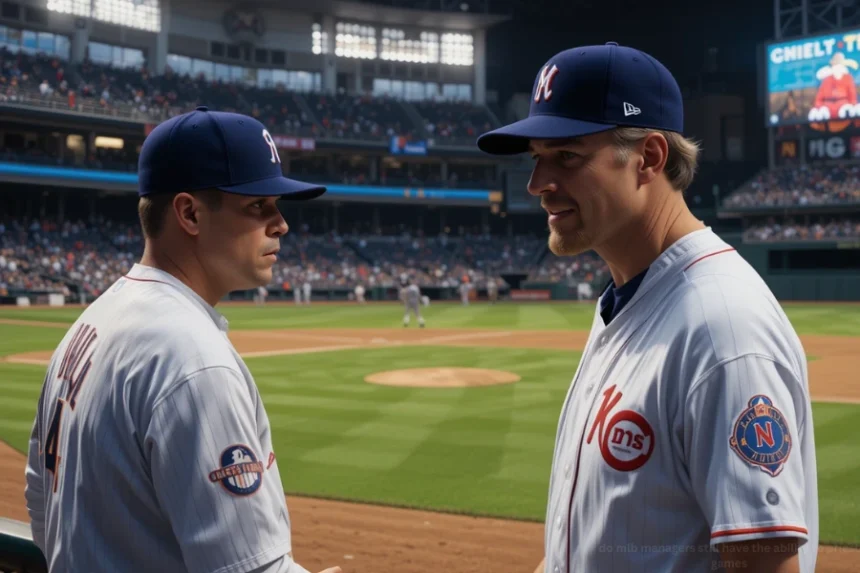Baseball is a sport rich in tradition and history, and within its long-standing customs, the role of the manager has always been pivotal. Over the years, the responsibilities of Major League Baseball (MLB) managers have evolved, especially concerning game management and strategic decisions. A question that often arises among fans and analysts today is: do MLB managers still have the ability to priest games? While the phrase “priest games” is somewhat unconventional, it likely refers to the manager’s authority to influence, control, or heavily influence the course and outcome of a game through strategic decisions. This article explores whether MLB managers today retain the power to “priest” or significantly impact their games, amidst modern rules, technological advancements, and changing MLB regulations.
The Role of an MLB Manager: Traditional Expectations
Historically, MLB managers have been viewed as the tactical masterminds of their teams, responsible for making critical decisions such as lineup composition, pitching changes, and defensive alignments. They act as the on-field leaders, guiding players through high-pressure situations, making real-time strategic calls, and sometimes even acting as emotional anchors for their teams.
In the classic sense, the manager’s influence, or their ability to “priest” games, was largely through intuitive judgment, experience, and understanding of the game. This included decisions like when to substitute a pitcher, how to handle bunt or stolen base situations, and tactical use of relievers. Before the advent of advanced analytics and technology, managers had more direct control over game flow via their decision-making.
Technological Advances and Their Impact on Managerial Power
In recent decades, technology has transformed baseball strategy profoundly. Data analytics, video review, and real-time statistics have become essential tools for MLB teams. Many front offices now provide managers with extensive data to inform their decisions, which has shifted some control from the manager to the front office analysts.
However, even with these changes, managers still retain a significant degree of authority on the field. They make critical decisions based on the analytics reports provided, and their game-day judgment remains vital. Therefore, while they may no longer rely solely on their intuition, they still have the ability to influence the course of the game through strategic choices—essentially “priest” games in their own right.
Is the Power to Priest Games Still in the Hands of MLB Managers?
The phrase “to priest games” may imply exerting influence or control over game outcomes, possibly even manipulating or heavily swaying the result. Addressing this from a regulatory and ethical perspective:
1. Rules and Regulations
MLB has strict rules prohibiting game-fixing, cheating, and any form of game manipulation. Managers are now heavily monitored, and any attempt to unfairly influence the game through illegal means would result in severe penalties, including suspensions or bans.
2. On-Field Authority
Despite the presence of advanced analytics, managers still hold the authority to make strategic decisions such as pitching changes, defensive shifts, and pinch-hitting. These decisions can have a profound impact on the game’s outcome, giving managers a legitimate ability to “priest” or influence the game within the bounds of rules.
3. Use of Technology and Sign-Stealing
In recent years, controversies such as the Houston Astros’ sign-stealing scandal have raised questions about the extent of influence managers and teams have outside of the rules. While sign-stealing, when done covertly, is against the rules, managers are not involved in the physical act, which is usually orchestrated by players or specialized staff.
4. League Oversight and Fair Play
MLB actively monitors and investigates any suspicious activities, making the odds of overt manipulation extremely low. Managers do not have the legal or official ability to “priest” games in a manner that would constitute cheating or unfair influence.
Can Managers Still Influence Game Strategy Significantly?
Absolutely. Modern MLB managers can still influence games heavily within the constraints of rules and ethics. Their decisions during the game—when to pull a pitcher, how to set the defensive alignment, or when to attempt a risky play—can dramatically alter the game’s outcome.
While they may no longer have the free rein they once had in the era of pure instinct, their strategic choices remain pivotal. In that sense, they still “priest” or control the flow of the game through expert judgment and tactical acumen.
The Limits of Managerial Power in Contemporary Baseball
It’s important to recognize the limits. The game is increasingly data-driven, and many decisions are made by analytics departments rather than by managers alone. Unexpected events, player performance fluctuations, and external factors also influence game outcomes beyond managerial control.
Additionally, MLB has regulations in place to protect the integrity of the game, which restricts the amount of influence managers can have, particularly when it comes to unlawful practices like game-fixing.
Conclusion: Do MLB Managers Still Have the Ability to Priest Games?
In summary, yes, MLB managers still have the ability to influence and “priest” games through their strategic decisions and on-field leadership. While the nature of their influence has evolved with technological advancements and strict regulations, their role remains vital to game execution.
Their authority to make tactical choices, combined with their experience and understanding of baseball, keeps them central figures in determining game outcomes. However, their influence must always operate within the boundaries of league rules and ethical standards. The core of baseball’s tradition—competence, strategy, and integrity—continues to define what it means for a manager to have the power to “priest” or guide their team to victory.



